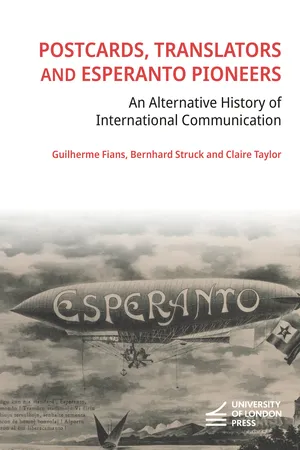
Postcards, Translators and Esperanto Pioneers
An Alternative History of International Communication
- English
- ePUB (mobile friendly)
- Available on iOS & Android
Postcards, Translators and Esperanto Pioneers
An Alternative History of International Communication
About this book
The early twentieth century was a time when steamships, international postal services and the telephone were setting the pace of an early wave of globalisation in Europe. In this increasingly international scenario, what role did language play? To address the geopolitical problem of cross-border linguistic (mis)understanding, international auxiliary languages like Esperanto were created. But what happened to a constructed language when it travelled to different places?
This book tackles these questions by exploring the letters, postcards and activities of John Beveridge (1857–1943) and his family. This Scottish clergyman was a proficient Esperanto speaker, translator and co-founder of several Esperanto organisations. His long-standing engagement with the language left a unique archive that reveals how many Esperanto speakers exchanged letters across borders, produced literature for an international readership, organised congresses and used this language as an entry point into modernity and globalisation from their 'marginal' positions in the world.
By tracing this language-based form of grassroots internationalism, the book uncovers wide-reaching networks connecting a corner of Scotland with rural settings and villages in Finland, Bulgaria and Brazil. Ultimately, it asks: what do we learn about international communication and globalisation through the lens of Esperanto and postcards? Focusing on a constructed language and communication technologies that preceded the dominance of global English and social media, this book offers an alternative vantage point on the history of international communication.
Frequently asked questions
- Essential is ideal for learners and professionals who enjoy exploring a wide range of subjects. Access the Essential Library with 800,000+ trusted titles and best-sellers across business, personal growth, and the humanities. Includes unlimited reading time and Standard Read Aloud voice.
- Complete: Perfect for advanced learners and researchers needing full, unrestricted access. Unlock 1.4M+ books across hundreds of subjects, including academic and specialized titles. The Complete Plan also includes advanced features like Premium Read Aloud and Research Assistant.
Please note we cannot support devices running on iOS 13 and Android 7 or earlier. Learn more about using the app.
Information
Table of contents
- Cover
- Title Page
- Copyright
- Contents
- List of figures
- Note from the authors
- Acknowledgements
- Introduction: Building worlds with words
- 1. Grassroots internationalism from small places: pen, ink and the forging of friendships in a constructed language
- 2. From learning the language to founding local clubs: the making of an Esperanto speaker
- 3. Gendered talk: Esperanto-speaking women and languages of egalitarianism
- 4. Speaking of the Lord to the master: John Beveridge, Ludwik Zamenhof and the Esperanto translation of the Bible
- Conclusion: The history of international communication via postcards and Esperanto
- Bibliography
- Index